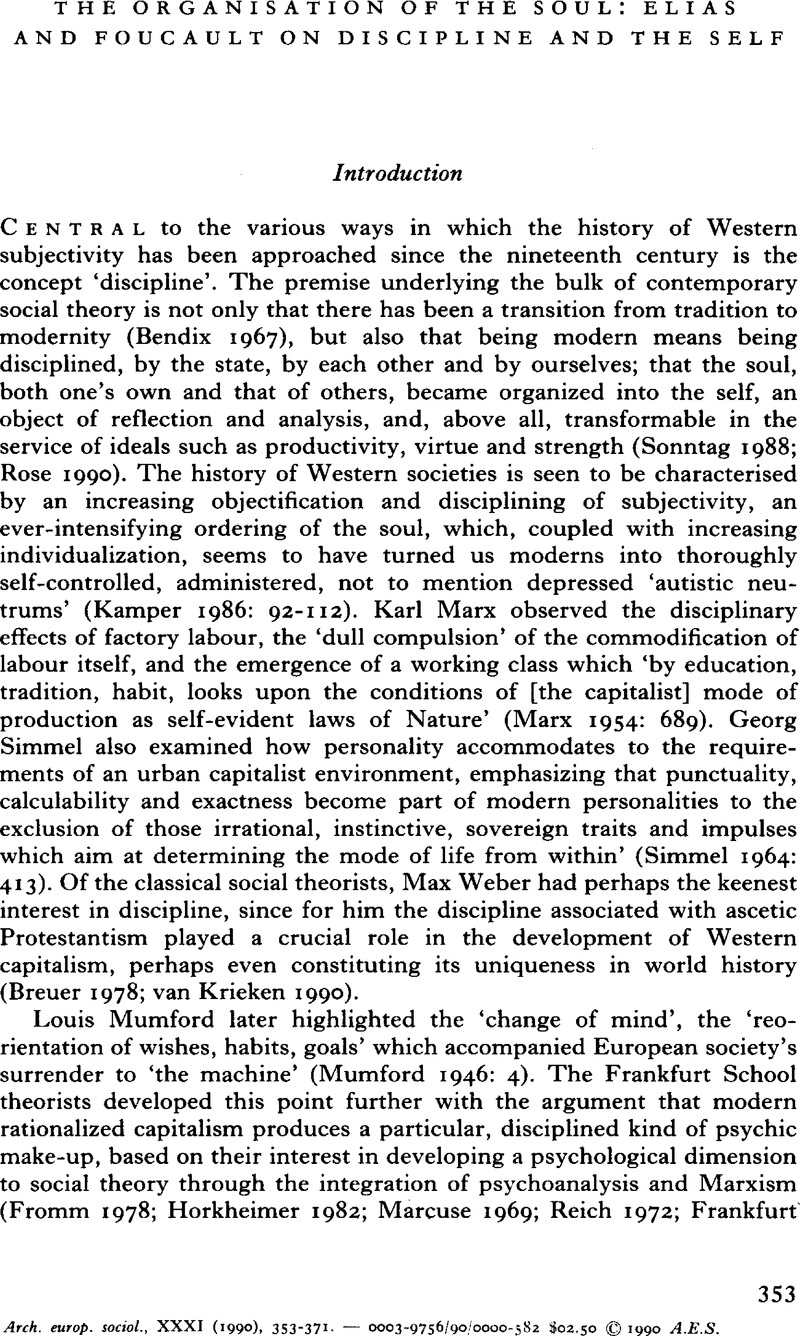Crossref Citations
This article has been cited by the following publications. This list is generated based on data provided by Crossref.
Tyler, William
1993.
Postmodernity and the Aboriginal Condition: the Cultural Dilemmas of Contemporary Policy.
The Australian and New Zealand Journal of Sociology,
Vol. 29,
Issue. 3,
p.
322.
Staeuble, Irmingard
1993.
Annals of Theoretical Psychology.
p.
137.
Hunt, Alan
1995.
The Role of Law in the Civilizing Process and the Reform of Popular Culture.
Canadian journal of law and society,
Vol. 10,
Issue. 2,
p.
5.
SZNAIDER, NATAN
1997.
Compassion and Control.
Childhood,
Vol. 4,
Issue. 2,
p.
223.
Schillmeier, Michael
Clegg, Stewart
Shenar, Gabriele
Wilson-Kovacs, Dana
Ansari, Sarah
Giles, Paul
Bagnall, Gaynor
and
Sykes, Karen
1999.
Book Reviews: Democracy without Enemies, Max Weber and Michel Foucault: Parallel Life Works, after Writing Culture, the Politics of Duplicity: Controlling Reproduction in Ceausescu's Romania, Jinnah, Pakistan and Islamic Identity: The Search for Saladin, Contemporary Cinema, the Politics of Display, Museums, Science, Culture, Transcendent Individual: Towards a Literary and Liberal Anthropology.
The Sociological Review,
Vol. 47,
Issue. 1,
p.
172.
van Krieken, Robert
1999.
The barbarism of civilization: cultural genocide and the ‘stolen generations’1.
The British Journal of Sociology,
Vol. 50,
Issue. 2,
p.
297.
Szakolczai, Arpád
2000.
Norbert Elias and Franz Borkenau.
Theory, Culture & Society,
Vol. 17,
Issue. 2,
p.
45.
Newton, Tim
2001.
Organization: The Relevance and the Limitations of Elias.
Organization,
Vol. 8,
Issue. 3,
p.
467.
Déchaux, Jean-Hugues
2001.
La mort dans les sociétés modernes : la thèse de Norbert Elias à l'épreuve.
L'Année sociologique,
Vol. Vol. 51,
Issue. 1,
p.
161.
2004.
Norbert Elias et l’anthropologie.
p.
230.
van Krieken, Robert
2005.
The 'Best Interests of the Child' and Parental Separation: on the 'Civilizing of Parents'.
Modern Law Review,
Vol. 68,
Issue. 1,
p.
25.
van Krieken, Robert
2007.
The Blackwell Encyclopedia of Sociology.
Clegg, Stewart
2009.
Foundations of organization power.
Journal of Power,
Vol. 2,
Issue. 1,
p.
35.
Binkley, Sam
2009.
The civilizing brand.
European Journal of Cultural Studies,
Vol. 12,
Issue. 1,
p.
21.
Baumeler, Carmen
2010.
Emotionalizing Organizations and Organizing Emotions.
p.
272.
Neocleous, Mark
2011.
The Police of Civilization: The War on Terror as Civilizing Offensive.
International Political Sociology,
Vol. 5,
Issue. 2,
p.
144.
Heaney, Jonathan G.
2011.
Emotions and power: reconciling conceptual twins.
Journal of Political Power,
Vol. 4,
Issue. 2,
p.
259.
McKinlay, Alan
2012.
Reinventing Hierarchy and Bureaucracy – from the Bureau to Network Organizations.
Vol. 35,
Issue. ,
p.
31.
Couacaud
2014.
The White Negro Reconsidered: An Exercise in Ethnographic Reflexivity.
Spectrum: A Journal on Black Men,
Vol. 3,
Issue. 1,
p.
49.
Reed, Annette Yoshiko
2014.
From Sacrifice to the Slaughterhouse.
Method & Theory in the Study of Religion,
Vol. 26,
Issue. 2,
p.
111.



